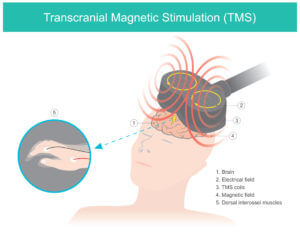
When it comes to treating depression, patients today have more options than ever before. For those who haven’t found success with traditional treatments, alternatives like Transcranial Magnetic Stimulation (TMS) offer new hope. At Denver Wellness Associates, we understand that every mental health journey is unique and choosing the right treatment can make all the difference.
In this blog, we’ll explore how TMS compares to more conventional therapies, including medication and Electroconvulsive Therapy (ECT), to help you better understand your options for managing depression symptoms and other mental health conditions.
What Is TMS?
Transcranial Magnetic Stimulation (TMS) is a non-invasive, FDA-approved treatment for major depressive disorder (MDD), as well as obsessive-compulsive disorder (OCD) and other conditions. It works by using magnetic pulses to stimulate a specific brain region associated with mood regulation. The goal is to improve brain activity in areas that are underactive in people experiencing major depression.
TMS is typically administered as a series of daily treatment sessions over the course of several weeks, and there are different forms, including standard and deep TMS. Unlike medications, TMS treatment targets the brain directly without systemic side effects.
Traditional Treatments: Medications and ECT
- Medications Antidepressants are often the first line of defense for treating depression. These include SSRIs, SNRIs, and other drugs designed to alter brain chemistry. While medications can be effective for many, they come with potential side effects such as gastrointestinal upset, low libido, weight gain, or emotional blunting. For some individuals, especially those with treatment-resistant depression, medications alone may not provide sufficient symptom relief.
- Electroconvulsive Therapy (ECT) ECT has been used for decades to treat severe or persistent mental illnesses. It involves delivering small electrical currents to the brain under anesthesia to trigger controlled seizures. Though effective for many patients with major depressive disorder, ECT is more invasive and can lead to side effects like memory loss and cognitive issues. It typically requires hospitalization or close clinical supervision.
How TMS Stands Out
TMS offers several key advantages over traditional treatments:
- Non-Invasive and Outpatient: TMS does not require anesthesia or recovery time. Patients can return to daily activities immediately after each session.
- Minimal Side Effects: Most patients report only mild scalp discomfort or headache during or after treatment sessions.
- FDA Approved: TMS is FDA-approved for treating major depressive disorder and OCD, offering a science-backed solution for individuals who haven’t found relief through medication.
- Personalized Treatment Schedule: At Denver Wellness Associates, TMS protocols are tailored to the individual. A typical treatment schedule includes five sessions per week for six weeks.
Is TMS Right for You?
TMS is especially beneficial for individuals experiencing treatment-resistant depression or those who prefer to avoid medication-related side effects. It has also shown promise in treating major depression long term, especially when combined with ongoing therapy and lifestyle changes.
Patients with obsessive-compulsive disorder (OCD) may also benefit from deep TMS, a variation designed to reach deeper brain structures associated with compulsive behavior patterns.
At Denver Wellness Associates, we provide thorough evaluations to determine whether TMS is a good fit based on your symptoms, history with treatment, and overall mental health goals.
A Promising Path Forward
The future of mental health care lies in options that are safe, effective, and tailored to individual needs. TMS treatment offers a modern approach for those ready to explore new paths to healing, especially when traditional methods haven’t worked.
Take the Next Step Toward Healing
If you’ve been struggling with major depression or are interested in learning more about TMS therapy, our team at Denver Wellness Associates is here to help. We’ll guide you through your options, answer your questions, and design a personalized care plan that puts your wellness first.
